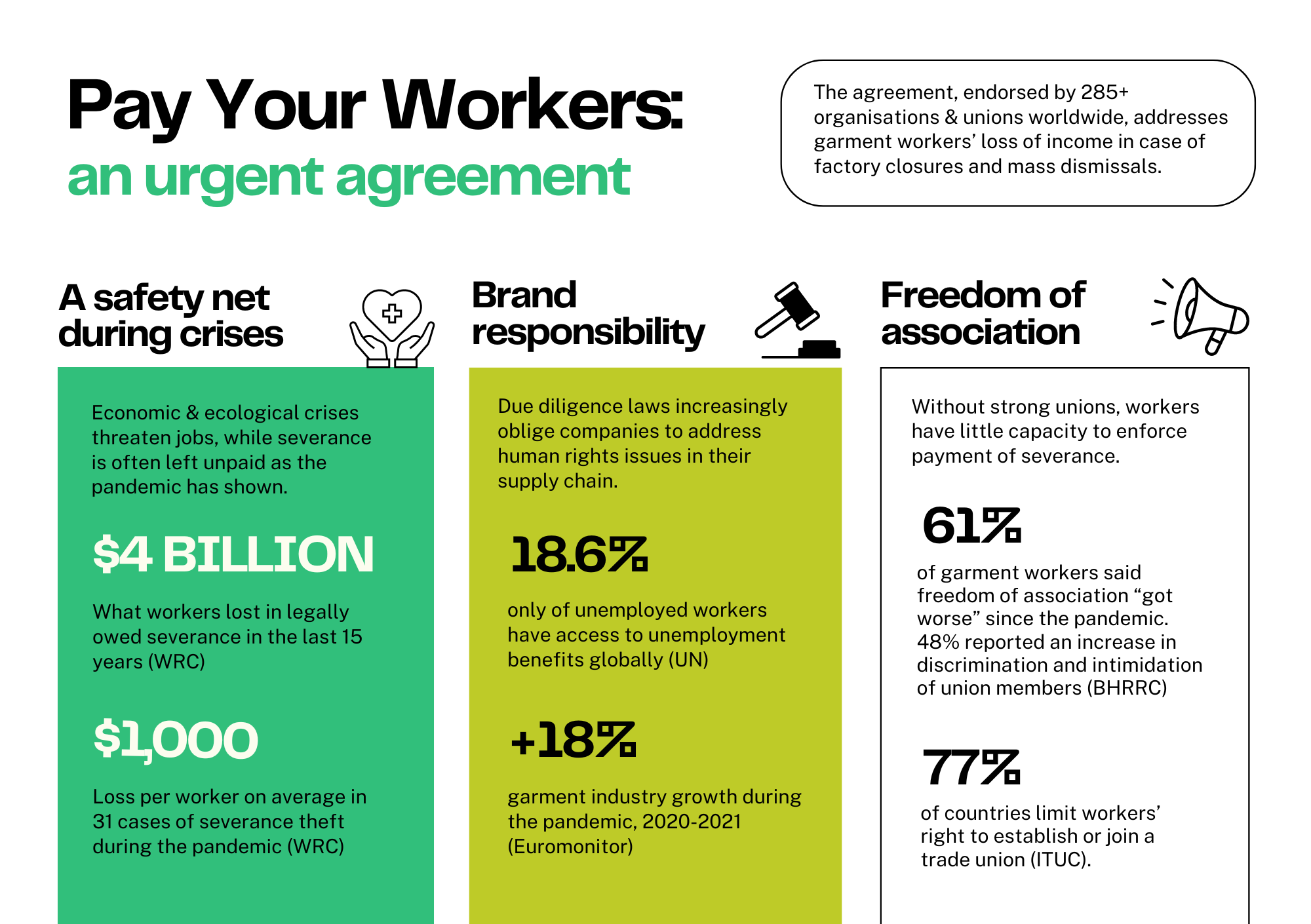Frequently Asked Questions For Governments
The SGF Agreement, endorsed by over 285 organisations worldwide, tackles two key longstanding issues in garment supply chains: severance theft and the violation of freedom of association. If signed, this legally binding and enforceable agreement between brands, employers, and unions establishes a global Severance Guarantee Fund (SGF) as well as a grievance mechanism to investigate violations of freedom of association and other core labour rights.
The Pay Your Workers-Respect Labour Rights or Severance Guarantee Fund (SGF) Agreement proposes an immediate and workable answer to four global trends:
the ongoing and growing climate breakdown and ecological crisis with all of its impacts, specifically also in the garment industry, thus needing an acute climate justice adaptation measure and institutional changes to the garment supply chains to support a just transition;
the lack of fully functioning social protection schemes (including the payment of severance) in production countries leading to extreme poverty in times of factory closures during, for example, a pandemic;
the legal obligation for companies to comply with due diligence requirements to prevent and address adverse human rights impacts in their supply chain;
the shrinking space for union organising and collective bargaining, especially in crises when the repression intensifies.
The climate and ecological crisis will not be a series of shocks, disasters, and catastrophes but rather an unfolding series of events that compound risks and impacts, leading to cascading effects alongside some shocks. The Severance Guarantee Fund Agreement is needed to structurally protect workers as this unfolds, not only as a crisis response.
In many low- and middle-income countries, workers are primarily protected by separation payments, including severance pay, in cases of job loss. However, not all workers receive this payment, as it depends on contractual agreements, employers' financial situation, and workers' ability to enforce payment. While building up national social protection schemes in production countries remains the goal, as long as these are not yet fully implemented, a bridging solution to fill the global regulatory gap is necessary to prevent workers and their children from sliding into extreme poverty when a factory closes.
What can governments do to promote the SGF Agreement?
Ensure this proposal is integrated into existing or future support programmes for social security.
Engage in a conversation with (trade) partners at the EU level and abroad about the lack of effective implementation of social security measures and the considerable risk this presents in the context of climate and ecological breakdown
and other crises.Organise events to foster conversation about the barriers to full functioning of social protection, the situation since the pandemic regarding building better social security systems, and the risks that climate breakdown and ecological crises will pose to the garment industry in the production hubs.
Support the SGF Agreement to create policy coherence.
Financially support the infrastructure to set up the Severance Guarantee Fund.
Call for a closure and evaluation of the ILO Call to Action.
Discuss the SGF Agreement with tripartite parties.
Join the Multilateral Partnership for Organizing, Worker Empowerment, and Rights (M-POWER) to support the international initiative to promote worker organising, unionisation and collective bargaining, engage in global issue campaigns supporting local action on worker priorities, country-level coordination to advance worker rights, and engage in urgent action to protect labour activists and organisations facing threats.
Support a feasibility study to determine how the global Severance Guarantee Fund would best proceed to ensure swift and secure payment to workers.
Support a feasibility study to explore the best mechanisms for how the global Severance Guarantee Fund contributes to building social protection schemes in production countries.
Public support for the SGF Agreement.
Engage with public procurement to support the SGF Agreement from that angle


